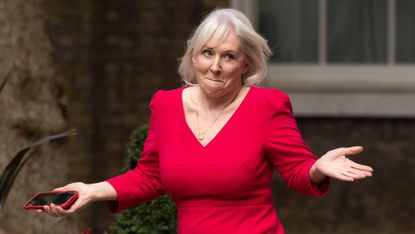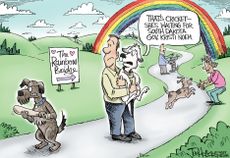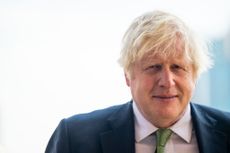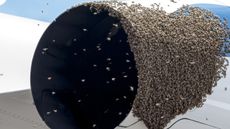‘Ignore Twitter and it becomes Angela Rayner in a broom cupboard screaming for people to resign’
Your digest of analysis from the British and international press

- 1. Are we witnessing the twilight of the woke?
- 2. Nadine Dorries will monster the arts
- 3. What’s the point of the Lib Dems? Judging by Ed Davey’s speech it’s a question he still can’t answer
- 4. Australia is making a risky bet on the US
- 5. Boris Johnson aims to push for more climate action during trip
1. Are we witnessing the twilight of the woke?
Tim Stanley in The Telegraph
on an anti-woke culture secretary
“Political correctness is losing its grip,” cheered Tim Stanley in The Telegraph in the wake of Nadine Dorries’ appointment as culture secretary. An “advantage of having a columnist in No 10” is that Boris Johnson has “upset everyone under the sun, but has learnt the best way to handle an angry letter is to put it in the bin”. If the PM ignores Twitter it “becomes Angela Rayner in a broom cupboard screaming for people to resign”. There has been a “liberating realisation” that Tory ministers needn’t quit “because they’ve upset four people on Twitter” and that a government can “confront the Left via legislation”. Heralding what he feels may be the “twilight of the woke”, Stanley welcomes steps to “protect free speech in universities and put the brakes on decolonisation”, and the government’s order for broadcasters to produce “distinctly ‘British’ content”. Dorries’ promotion “is not a two fingers up to the culture industry”, he says, “but the direction of travel”.
Subscribe to The Week
Escape your echo chamber. Get the facts behind the news, plus analysis from multiple perspectives.

Sign up for The Week's Free Newsletters
From our morning news briefing to a weekly Good News Newsletter, get the best of The Week delivered directly to your inbox.
From our morning news briefing to a weekly Good News Newsletter, get the best of The Week delivered directly to your inbox.
2. Nadine Dorries will monster the arts
Sarah Ditum on Unherd
on the perfect bogeyman
“For years now, people in the arts have been wishing for the culture brief to go to someone who is actually interested in culture,” wrote Sarah Ditum on Unherd. This comes after a range of recent office-holders, from “PR man” Jeremy Hunt to Matt Hancock, “whose passion for the arts reached the ecstatic heights of quite liking Galway Girl by Ed Sheeran (in 2018, that was the most intimate thing any of us knew about Hancock, and what a blessed time it was)”. So, for the arts world, Dorries “is the thing outside”. She writes books, she’s been a primetime star and “she was one of the first MPs to be active online, and started blogging in the noughties, around the time David Cameron was still making woeful ‘tweet’/twat’ puns”. Dorries “could hardly be better credentialed”, said Ditum, but at the same time she has an “undoubted capacity to turn every minor dispute into a flame war”, be it the licence fee or culture wars. “The arts world will be unable to resist responding with passion, fury and polarisation,” concluded Ditum. “Dorries is the perfect bogeyman, an irresistibly perfect enemy: she’s exactly the thing they wished for.”
3. What’s the point of the Lib Dems? Judging by Ed Davey’s speech it’s a question he still can’t answer
Ian Dunt in The i
on an eerie silence
“What’s the point of the Liberal Democrats?” asked Ian Dunt. Having heard the speech by leader Sir Ed Davey at this year's party conference, the i news columnist feels that he still can’t answer the question. During the coalition years, Dunt reminded us, the party “embraced the right-wing laissez-faire model” but mainstream opinion is now “largely accepting the need for extensive state intervention in the economy”. Dunt wondered where the party stands on this spectrum now. “Liberalism is facing a battle for its life,” he declared, as a “global wave of nationalist politics” threatens liberal principles. Britain needs a “vibrant, proud liberal voice”, added Dunt, but “there is only an eerie and despairing silence – the product of a leadership which does not have the bravery to stand up for its values or the capacity to articulate them”.
4. Australia is making a risky bet on the US
Sam Roggeveen in The New York Times
on the trilateral defence agreement
The Aukus submarine deal has “thrust Australia into a central role in America’s rivalry with China”, Sam Roggeveen wrote in The New York Times. For many US observers of China’s increasing aggression, Australia has become the “canary in the coal mine for great power competition with China”, subject to economic coercion from Beijing, hacking and reports of espionage, said Roggeveen, director of the International Security Program at the Lowy Institute, a research centre in Sydney. “For most of its history, Australia has relied on a friend or ally to help secure the Pacific Ocean,” he adds, so it makes sense that it would want to bring the US “into a closer embrace”. Yet, “the United States is in Asia by choice; Australia has no such luxury”. Roggeveen asked: “Why should the United States commit itself to a contest with China when the stakes are less than existential? Without a clear answer to that question, Australia must assume that it will ultimately need to ensure its security alone.”
5. Boris Johnson aims to push for more climate action during trip
Laura Kuenssberg at BBC News
on a major excursion
“Boris Johnson bounced from behind the grey curtain on the plane, clearly delighted to be travelling out of the UK, press pack and uniformed RAF stewards in tow, not the pilot perhaps, but acting as the host of the government plane he has had repainted with the Union Jack on the tail, urging journalists to approve of the new paint job,” wrote the BBC’s political editor Laura Kuenssberg, who travelled with the PM to the US this week. However much he enjoys being back in the air, this trip doesn’t come at an easy moment, as his government grapples with “rising fears about supply chains, a shortage of gas and its many potential consequences”, says Kuenssberg. Bill hikes could also be a “tricky consequence” of the actions ministers want to take to combat climate change, she added. “This is the start of a major trip for Mr Johnson – climate talks in New York when the issue has never mattered so much at home; a head-to-head in the White House, after the visible chaos as the two countries left Kabul; a world of shifting allegiances as the worst of Covid seems hopefully past at home.”
Create an account with the same email registered to your subscription to unlock access.
Sign up for Today's Best Articles in your inbox
A free daily email with the biggest news stories of the day – and the best features from TheWeek.com
-
 5 high-caliber cartoons about Kristi Noem shooting her puppy
5 high-caliber cartoons about Kristi Noem shooting her puppyCartoons Artists take on the rainbow bridge, a farm upstate, and more
By The Week US Published
-
 The Week Unwrapped: Why is the world running low on blood?
The Week Unwrapped: Why is the world running low on blood?Podcast Scientists believe universal donor blood is within reach – plus, the row over an immersive D-Day simulation, and an Ozempic faux pas
By The Week Staff Published
-
 Rishi Sunak's asylum spat with Ireland explained
Rishi Sunak's asylum spat with Ireland explainedIn Depth Irish government plans to override court ruling that the UK is unsafe for asylum seekers
By The Week UK Published
-
 Mouse keeps tidying up man's shed
Mouse keeps tidying up man's shedTall Tales And other stories from the stranger side of life
By Chas Newkey-Burden, The Week UK Published
-
 'Dead' woman nearly suffocated in morgue bag
'Dead' woman nearly suffocated in morgue bagTall Tales And other stories from the stranger side of life
By Chas Newkey-Burden, The Week UK Published
-
 Joker causes shark panic in Torquay
Joker causes shark panic in Torquayfeature And other stories from the stranger side of life
By Chas Newkey-Burden Published
-
 Boris Johnson shocks UK by resigning from Parliament
Boris Johnson shocks UK by resigning from ParliamentSpeed Read
By Justin Klawans Published
-
 Bees delay flight for three hours
Bees delay flight for three hoursfeature And other stories from the stranger side of life
By Chas Newkey-Burden Published
-
 Australia to purchase up to 5 submarines from U.S. as part of defense pact, report says
Australia to purchase up to 5 submarines from U.S. as part of defense pact, report saysSpeed Read
By Justin Klawans Published
-
 Merseyside newlyweds among four killed in Australia helicopter collision
Merseyside newlyweds among four killed in Australia helicopter collisionSpeed Read Wirral couple Ron and Diane Hughes died in mid-air crash near Sea World in Queensland
By Sorcha Bradley Published
-
 Pony mayor banned from pub garden
Pony mayor banned from pub gardenfeature And other stories from the stranger side of life
By The Week Staff Published